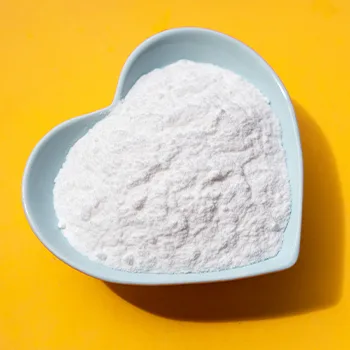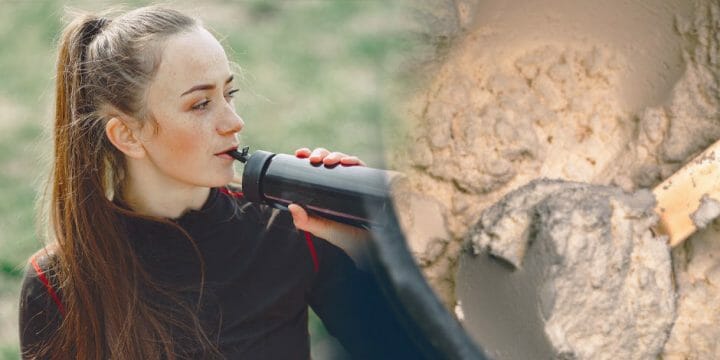Professional powerlifters and NFL players often sniff a small bottle or capsule during events and training. As a strength coach, I've observed the benefits of ammonia, commonly used in these situations.
However, its effects may not be as significant for gym newcomers.
Let's delve into the science of smelling salts to understand their impact and suitability.
Quick Summary
- Powerlifters sniff ammonia salts before heavy lifts to enhance performance, particularly under heavier weights, by increasing alertness and focus.
- Ammonia salts trigger deep breathing and adrenaline release, preventing fainting and boosting focus, making them ideal for intense weightlifting tasks.
- Some research, including a study from the European Journal of Sport Science, suggests that the immediate effects of smelling salts on breathing don't necessarily translate into measurable improvements in athletic performance.
- Based on my coaching experience, while smelling salts aren't a strength-building miracle, they can be a game-changer for athletes aiming for personal records in heavy lifts.
What's In That Bottle That Powerlifters Sniff Before A Heavy Lift?

That little bottle that powerlifters keep in their pocket contains ammonia (NH3), usually in powder form.
You can also get small ammonia caps that you break open under your nose to give you one dose of the active ingredient.
According to the British Journal of Sports Medicine, when you sniff smelling salts, you trigger an inhalation reflex [1].
It's what boxing coaches used to reach for if their fighter hit the deck after a knockout.
This not only fills the lungs with air and more oxygen but also causes the body to release more adrenaline [2].
All this combined gives athletes more alertness, focus, and even better strength performance during a powerlifting competition.
Let's take a closer look at what exactly happens.
Why Do Powerlifters Sniff Ammonia Salts?

Powerlifters sniff ammonia salts to enhance performance, particularly under heavier weights.
Preventing Feeling Faint
Inhaling ammonia gas, an old remedy for fainting, increases and deepens breathing.
This is crucial for bodybuilders lifting loads heavier than their body weight, as it prevents lightheadedness.
Ammonium carbonate in the salts triggers deep breaths and adrenaline release, boosting heart rate and blood flow to the brain and reducing the risk of fainting.
Boosting Focus And Motivation

From my coaching sessions, I've seen ammonia salts deliver an instant focus boost, a stark contrast to caffeine's gradual effect.
This rapid response, coupled with an adrenaline surge, effectively preps athletes for intense lifts, especially when aiming for personal records.
Reducing Muscle And Joint Pain
Now, I don't want to suggest that you ignore the pain that could be the result of an injury.
But when you lift a heavy load, your muscles will start burning under the buildup of lactic acid, as stated in the WebMD [3].
"When you exercise, your body uses oxygen to break down glucose for energy. During intense exercise, there may not be enough oxygen available to complete the process, so a substance called lactate is made. Your body can convert this lactate to energy without using oxygen. But this lactate or lactic acid can build up in your bloodstream faster than you can burn it off."
- WebMD.com
As the Cleveland Clinic states, it seems like the fight or flight response that your body goes into distracts your body from the pain until you're done with the heavy lift [4].
Related Article: Best Joint Supplements To Relieve The Pain
Lifting Heavier Weights
The combined effects of increased oxygen intake, adrenaline-driven heart pumping, and heightened focus can lead to lifting heavier weights, according to the Journal of Strength and Conditioning Research study [5].
Despite some studies suggesting otherwise, my experience with athletes shows significant performance improvements.
What Does Science Say About How It Works?

Science shows that smelling salts triggers a reflex, causing fast, deep breaths.
This happens when the salts irritate the mucous membranes in the nose and lungs, prompting the body to clear the irritant.
Once inhaled, they activate the sympathetic nervous system, leading to a surge in adrenaline, similar to the body's natural fight or flight response to danger, as explained by Harvard Health [6].
However, a study from the European Journal of Sport Science found no direct link between smelling salts and enhanced physical performance [7].
While this shouldn't be overlooked, it's worth considering personal experiences with smelling salts to gauge their effectiveness.
What Does Ammonia Smell Like?
Having been around athletes using ammonia, I can attest to its strong, sweat-and-urine-like odor. It's certainly an acquired scent and not the most pleasant experience for the uninitiated.
Now, before you try to smell your own pee and sweat mix, I'd suggest that there's an easier way to find out what it smells like without buying some.
Go find a window cleaning product at home and check if it contains ammonia. It's possibly labeled as NH3, the chemical formula for ammonia [8].
Spray some of the cleaning agents on a paper towel and see if you get that very strong acidic smell in your nose.
It’s not pleasant, and smelling salts will be considerably stronger than what you’d get with any kind of cleaning product.
Who Should Not Use Smelling Salts?

Anyone who has lung conditions like asthma or bronchitis should steer clear of smelling salts.
Ammonia can worsen these conditions due to its reaction with nasal and lung mucus.
Even if you're a seasoned powerlifter, don't ignore even mild respiratory issues. Remember, smelling salts aren't a strength-building miracle; they simply sharpen focus and adrenaline.
Use them only if you're aiming for personal records in heavy, single-rep lifts, not as a regular part of your training.
Timing and Frequency of Use
In my practice, I advise athletes that smelling salts acts swiftly, with effects lasting around 4 to 5 minutes. I recommend using them 30 to 60 seconds before a major lift for optimal focus, based on what I've observed in training sessions.
However, limit their use.
Overuse can cause headaches, coughing, or even nasal damage, as per WebMD [9]. They're best reserved for key moments, like personal best attempts or competitions, to avoid potential physical and psychological dependency.
For a safer, more sustainable focus boost, consider natural alternatives like peppermint oil or ginseng.
Where Can You Buy Smelling Salts?

As a coach, I often guide athletes to sports and diet supplement stores for smelling salts and ammonia capsules, which are practical for gym use.
So, the next time you're shopping for some protein shakes and pre-workouts, see whether they offer a product like Nose Tork.
I personally prefer the single-use capsules, as they are easier to store and bring with you to the gym.
They work by cracking open the capsule and holding it about 10 inches away from your nose. And they are small enough to keep in your pocket until you need them.
Related Article: Can You Snort Pre-Workout?
FAQs
Are Ammonia-Smelling Salts Safe?
Yes, ammonia-smelling salts are generally classed as safe and have been used for hundreds of years to revive someone who has fainted. If you have any lung conditions, it's best to avoid them, as they irritate the membranes of the nose and lungs.
Are Ammonia Salts Banned in Boxing?
Yes, ammonia salts are banned at most boxing events. However, they are still commonly used in powerlifting competitions in the NFL and NHL, and they are not classified as illegal.
References:
- https://www.ncbi.nlm.nih.gov/pmc/articles/PMC2579444/
- https://www.medicinenet.com/why_do_athletes_use_smelling_salts/article.htm
- https://www.webmd.com/fitness-exercise/exercise-and-lactic-acidosis
- https://health.clevelandclinic.org/what-happens-to-your-body-during-the-fight-or-flight-response/
- https://pubmed.ncbi.nlm.nih.gov/28922211/
- https://www.health.harvard.edu/staying-healthy/understanding-the-stress-response
- https://pubmed.ncbi.nlm.nih.gov/34228592/
- https://www.mda.state.mn.us/pesticide-fertilizer/anhydrous-ammonia
- https://www.webmd.com/brain/are-smelling-salts-safe
About The Author
You May Also Like






